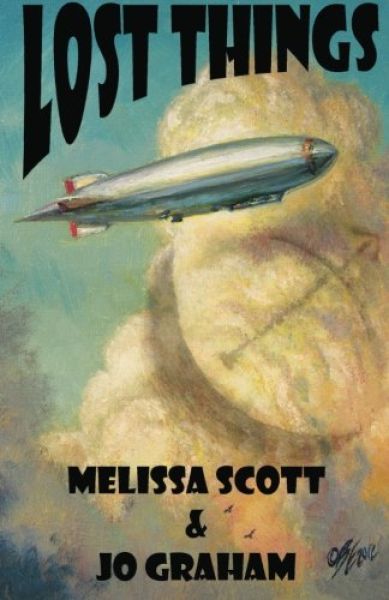Jazz Age Occult Adventure
Lost Things (Order of the Air, volume 1)
By Melissa Scott & Jo Graham

24 Mar, 2015
0 comments
2012’s Lost Things is the first installment of Scott and Graham’s ongoing historical fantasy series Order of the Air, whose fourth volume was published just this last February.
~oOo~
America in the 1920s wasn’t the sort of place where a pilot with the last name Segura could expect employment — at least not if there were any other, whiter, candidates competing for the same position. Alma Gilchrist of Gilchrist Aviation was the exception, willing to hire a Hispanic pilot. She and Lewis Segura got on so well that by the beginning of Lost Things the two are a couple.
Alma and her academic friend Jerry Ballard (with whom Alma has a complicated relationship; “it’s complicated” should be Alma’s motto) are members of the Lodge, a cabal of occult scholars and practitioners. By virtue of his relationship with Alma, Lewis is dragged into her world of the supernatural.
In a world where the occult is a very real thing, a world where the creatures of myth have been inspired by very real entities, you might think rule one would be “shoot all archaeologists on sight before they have a change to dig up that which should have remained buried.” No one seems to have discovered this useful rule; indeed, Alma’s fellow Lodge member Henry is quite keen on stuff being dug up and has the financial means to help make it happen.
An archaeological dig at Italy’s Lake Nemi provides an object lesson in the dangers of discovery. The dig has turned up something that mundanes might call an interesting relic of the reign of Caligula. Occult scholars would prefer a more accurate term: Sealed Evil in a Can.
The Thing from Lake Nemi has been contained for two thousand years. When it is freed by the all-too-curious members of the Lodge, it’s quick to steal itself a new host and leg it. It finds itself in an America that, though divided by class and race, is all too law-abiding for its needs. No one in America can offer it the same sort of power and license it enjoyed when it was clothed in the body of a Roman Emperor. The Europe of 1929, however, seems far more promising.
Since the authorities have no idea that such demonic entities exist [1], it’s up to Alma, Lewis, Jerry, and to a much lesser extent their wealthy pal Henry, to pursue the demon across America, hoping to run it to ground and contain it. Left free, it would only be a matter of time before it appropriated some dictator’s body and ushered in an age of carnage and depravity on a scale of which it could only dream two millennia ago. However, it will take on other bodies as necessary. Alma and company will discover, to their cost, that an interest in the occult does not confer any sort of immunity to possession.
~oOo~
As in previous Scott novels (I am not familiar with Graham’s), the authors don’t feel constrained to write characters with conventional relationships, gender roles, or sexual orientations. Also as in previous Scott novels, the people in those relationship are very civilized and sophisticated about it all. The difference is in the setting; 1920s America rewards nonconformity with disapproval and jail time. The need to avoid close scrutiny is a plot point in this book (although more so in the next one).
A geeky sidenote: at least one (or perhaps both) of the authors must be an aviation enthusiast. This book offers a nice tour of various transportation methods characteristic of the early 20th century, from trains to airships to aeroplanes.
Lost Things has to serve as an introduction to the series and also as a stand-alone adventure. I am happy to say that while later books are better, this one is perfectly fine in its own right. Although I am going to review the first three of the Order of the Air books separately, you don’t have to acquire them that way; an omnibus of the first three books in the series is available for a very reasonable sum: under a dollar at the time of writing!
1: Given the excesses of this period, that’s probably just as well. Imagine what Stalin, for example, could do with the excuse “there are literal capitalist demons who could possess anyone in Russia with the obvious exception of Stalin.”
